Execute a free Indiana warrant search to help determine if law enforcement is looking for you or someone you know.
There are online search tools that can provide answers and insights at no cost; furthermore, you can contact state courts, county sheriff’s offices, local police departments, and other government agencies to learn about warrants issued in your area.
This resource will guide you through the most efficient ways to look up warrants in Indiana for free, making the process quick and convenient.
Can Anyone Access & View Warrants Issued in Indiana?
For the most part, warrants issued by courts in the state of Indiana are available to the public. You or anyone else can search public record systems for arrest warrants, bench warrants, probation warrants, tax warrants, and more.
Many warrants can be found through free online searches, while others may require you to make an official request with a government agency.
Some warrants in Indiana are confidential and are not available to the public. This may be because the warrant involves an open law enforcement investigation or because the document contains sensitive information.
As a member of the public, you have the right to access warrants issued in Indiana due to the Access to Public Records Act (APRA).1 The state has the power to exempt some records from this law, and it is not obligated to provide information for free or online.
An Overview of Conducting Indiana Warrant Searches
In order for you or someone else to find outstanding warrants in Indiana, you’ll need a few important pieces of information.
At a minimum, you will need a part of the person’s name, preferably last, to successfully complete an Indiana warrant search. Some search tools will require both a first and a last name. Any additional information, such as the person’s date of birth, location, and type of crime, could help narrow down your search.
Indiana has multiple agencies that provide information about warrants. Since the state uses a unified court records system, you may want to start at the broadest level using Indiana’s Judicial Branch free case search page. This service provides all the documents filed for a certain case, except those that have been sealed due to confidentiality.
Once you learn more about the warrant, you can find the specific jurisdiction to get more details. There are a handful of small towns that are not yet on the statewide record system.
Some counties in Indiana provide information about warrants, often through their Sheriff Departments. There are also a few cities that will list active warrants in their jurisdiction, but most will point back to the state record system. You can also search for federal warrants issued for Indiana residents through the FBI, DEA, and U.S. Marshals.
How To See Who Has a Warrant in Indiana
There is more than one way to look up warrants in Indiana. You can do a broad search at the state level through the state’s judicial branch, or you can look for warrants in individual counties, such as Allen and Lake. At a minimum, you will need at least one piece of information, such as a first or last name, to successfully search the case files
View Warrants Through the Indiana Judicial Branch: You can see if you or someone else has a warrant by using the Public Records system operated by the Indiana Judicial Branch.2 On its website, there is a case search page that allows you to find court records based on a range of criteria, including:
- First, Last, or Middle Name
- Date of Birth
- Name of Attorney
- Case ID
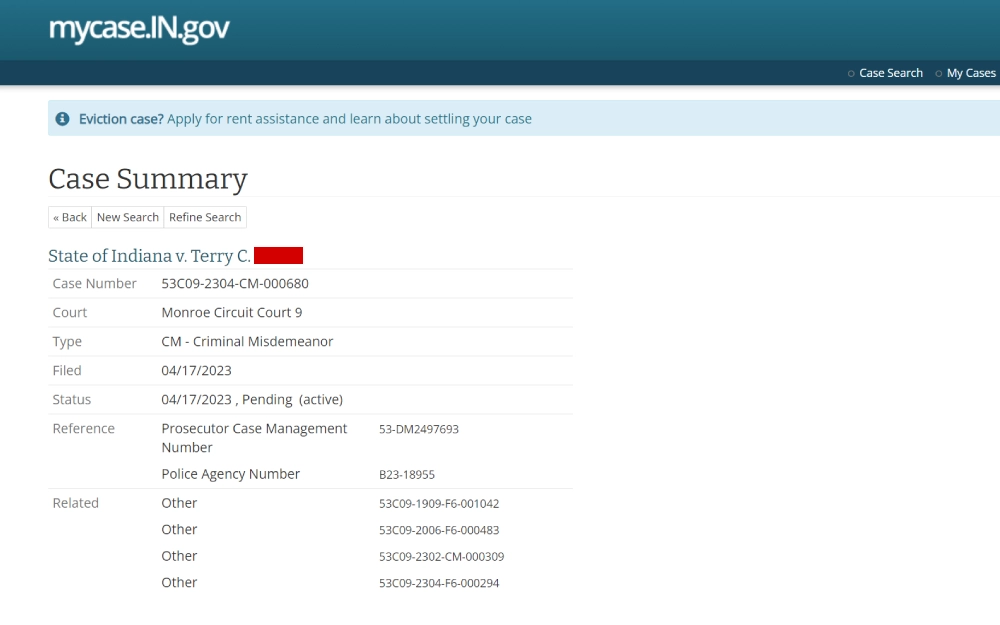
Keep in mind that this public records system only contains information used in Indiana courts that use the Odyssey Case Management System.
Thankfully, all 92 county courts are now on the system, but there remain a few towns and cities that are not. Also, this is not a direct warrant search. You will need to look up a relevant case and search through its filed documents to find out if it contains a warrant.
Most cases involving Indiana search warrants will be at the county level, but you may find warrant records in the state’s appellate court and supreme court. In these cases, the warrants are usually no longer active.
Find Warrants Through the Indiana State Police: The Indiana State Police maintains a Limited Criminal History Search Tool that requires a subscription to use.4 Unlike the judicial branch’s case search system, this is not a free service, but some subscribers, such as non-profit organizations and schools, can get an exemption. The cost is $15 per record for subscribers.
Retrieve Warrant Records via Local Courts & Law Enforcement Agencies in Indiana
Warrant searches may also be run at even more local levels; cities, towns, and other municipalities often host this information and disperse it through their law enforcement agencies or local courts. Check out the examples below for insight on where to turn.
Warrant Searches via the Lake County’s Sheriff’s Department: You can search for records online using the Lake County Sheriff’s Warrants Search. The Lake County Sheriff’s Department allows the general public to search for warrants by name or by area.
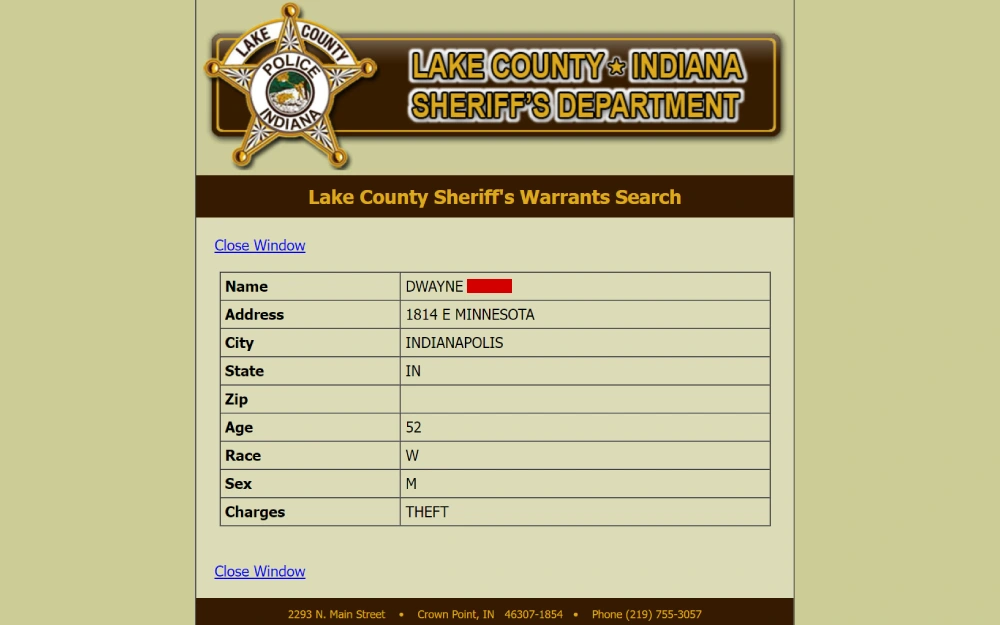
If you’re searching for an individual, the minimum requirement is a first name. If searching by a particular area, you’ll need the zip code. You may also be able to find a warrant by calling or visiting the department:
Lake County Sheriff’s Department
2293 North Main Street
Crown Point, IN 46307-1854
Phone (219) 755-3057
Find Warrants in Allen County: The Allen County Sheriff’s Department provides information about its warrants through a free online warrants network. There is a search function and browsing page where you can sort the warrants by issue date. You can also contact the department directly to learn about any warrants in its system.
Allen County Warrants & Fugitives Division
715 South Calhoun St., Room 104
Fort Wayne, IN 46802
Phone: (260) 449-7636
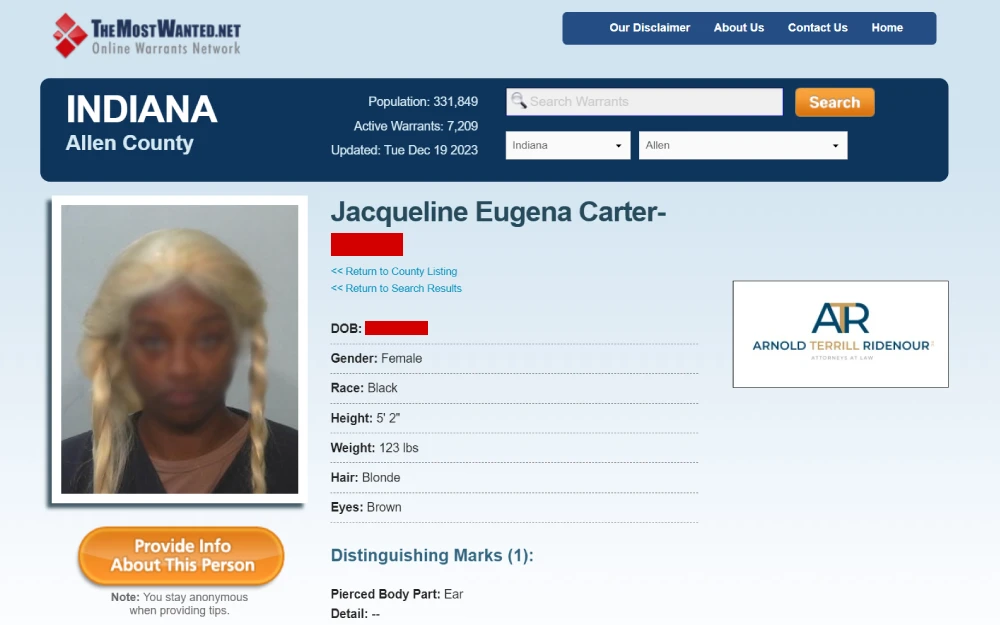
See If You or Someone Else Has a Warrant in Hamilton County: To look up an active warrant in Hamilton County, you can call the sheriff’s department at (317) 773-1872 during business hours, which are Monday through Friday, 8 a.m. – 4:30 p.m.
You can also call (317) 776-9800 after hours. The county does not operate an online search tool, but you may visit the department in person:
Hamilton County Sheriff’s Department
18100 Cumberland Road
Noblesville, IN 46060
Fax Number: (317) 776-9835
Email: [email protected]
Request Warrant Records via the Elkhart County Sheriff’s Department: Elkhart County does not provide a search tool for warrants, but it does allow people to submit a request for an adult’s criminal history.7 The report will show all criminal incidents, including warrants, contained in a person’s record. This is not a free service; you need to include a $3 check in your request form.
You may also want to contact the sheriff’s department directly, but keep in mind you may be arrested on site if you have an active warrant.
Elkhart County Sheriff’s Department
26861 County Road 26
Elkhart, IN 46517
Sheriff’s Office & Jail: (574) 891-2100
Search for Outstanding Indiana Warrants in Vanderburgh County: The Vanderburgh County Sheriff’s Department operates a detailed warrants search page. You can browse all active warrants or search for a specific one with just a last name. When browsing the list of warrant records, you can see the person’s name, age, race, bond amount, and reason for issue.
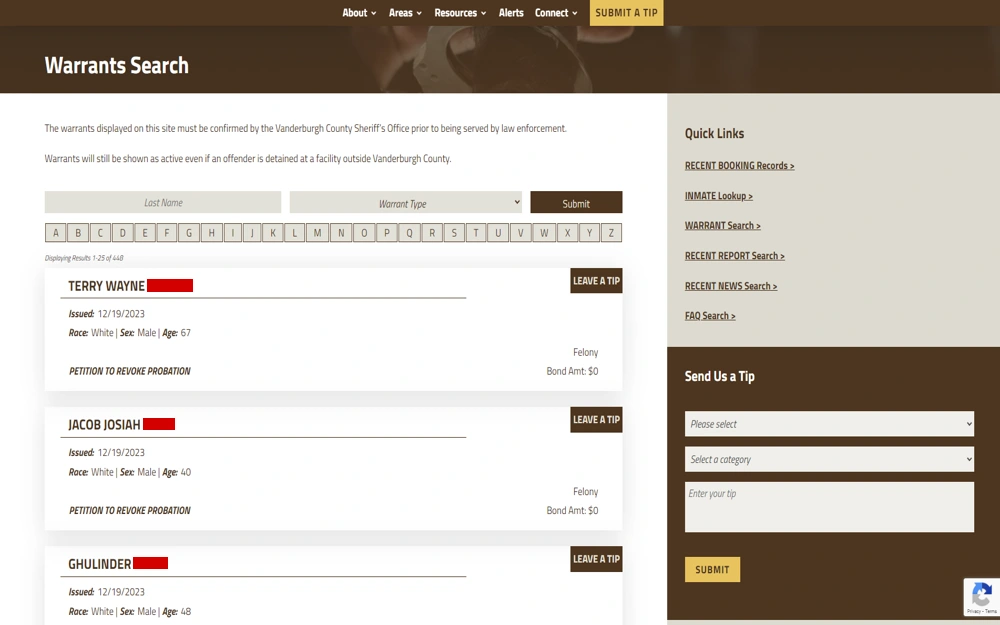
You can also leave a tip directly on the website if you have information you wish to give about the person subject to the warrant.
Vanderburgh County Sheriff’s Department
3500 N. Harlan Avenue
Evansville, IN 47711
Warrants Department: (812) 421-6200
Find Indiana Warrants in Lafayette via a Fugitive Search: The Fugitive Search tool on the City of Lafayette’s website provides the names, descriptions, and charges of people who are wanted by city police. You can search by any criteria you wish, including details about the criminal offense.
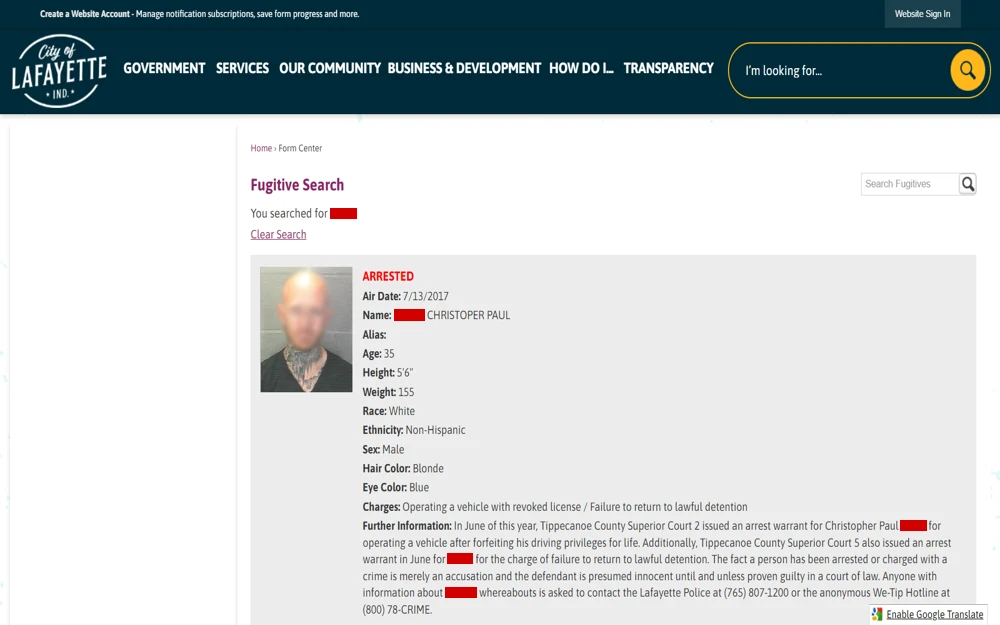
Search for Federal Warrants in Indiana & the U.S.
The United States Department of Justice issues warrants for people in Indiana when they are part of a federal case or investigation. While not as common as state warrants, there are plenty of resources available for looking.
Search the FBI Top Ten Most Wanted List: The Federal Bureau of Investigation’s Top Ten Most Wanted Fugitives List is one of the most famous bulletins of fugitives in the world.10 While most people with a warrant in Indiana will likely never make the top ten list, they may be one of hundreds of people listed in the fugitives database. You can browse all of the fugitives in the database or filter by description, date, and type of crime.
Look at the DEA Fugitives List: The Drug Enforcement Agency (DEA) has a Top Ten List of Most Wanted Fugitives that’s similar to the FBI’s but focused on drug crimes. It also has a larger database with a search function and filters that allow you to choose the sex of the party and the jurisdiction of the warrant. Indiana cases will likely be listed in the Chicago Division.
Check Who Is on the U.S. Marshals’ Most Wanted List: The United States Marshals Service is a federal agency that’s responsible for executing many federal arrest warrants, and it runs its list of 15 Most Wanted Fugitives. The list provides detailed information about the wanted individual and their alleged crimes.
While the U.S. Marshals don’t have a public database of all wanted individuals, an attorney can help you make a FOIA request to see if you have a warrant out for your arrest.
The Warrant Information System (WIN) is another way to look up federal warrants, but it is not available to the general public.
Find Federal Warrants Through the PACER system: PACER (Public Access to Court Electronic Records) has records for all documents filed in federal cases, and you can find warrants by looking through the docket history.11 You need to sign up for PACER and provide payment information to use the search. You don’t need to pay to use the system unless you spend $30 or more per quarter.
Types of Warrants Issued in IN & What They Mean
In Indiana, warrants are issued for a variety of reasons in order to enforce the law. Some involve criminal offenses while others are for civil issues and traffic offenses.
Arrest Warrants in Indiana: An arrest warrant in Indiana serves the purpose of bringing a person into the custody of police when they have been indicted with a crime. A warrant can also be issued by a judge or magistrate if there is probable cause that a person has committed a crime.
There are a few requirements for arrest warrants in Indiana according to the state code.12 The warrant must:
- Be in writing
- Be signed by a judge
- State the nature of the offense
- Specify the amount of bail (if any)
Bench Warrants in Indiana: When a person who is compelled to appear in an Indiana court at a certain date and time does not show up, the presiding judge of that court can issue a bench warrant. This empowers the police to apprehend the individual and force them to face the judge.
Judges can also issue bench warrants in Indiana when people fail to follow a court order or when they do not pay their court fines, which is known as a capias pro fine.
Probation & Parole Violation Warrants in Indiana: If a convicted person in Indiana is suspected of violating the conditions of their parole or probation, a warrant may be issued. It must be signed by the chairman of the parole board, and it can be executed by a member of the relevant parole department or by anyone within the jurisdiction who is otherwise authorized with this power.
If there is probable cause that the subject is out of state, the board can issue an arrest warrant and order the person to be returned to Indiana when detained.
Traffic Warrants in Indiana: Defendants who are accused of committing misdemeanor or felony traffic violations in Indiana and fail to make their court appearance can get a warrant issued in their name by the presiding judge. This works the same way as a bench warrant. Lower-level traffic violations, or infractions, are not considered as serious and will not involve a warrant.
Child Support Warrants in Indiana: Failure to make child support payments in Indiana can lead to a warrant, but state and local agencies have many paths to collecting funds before they will resort to this measure, such as garnering wages or enforcing bank liens. A warrant will usually only be issued if a person is indicted for a misdemeanor or felony related to child support.
Fugitive Warrants in Indiana: Any person who escapes the custody of another state’s law enforcement agency may have a fugitive warrant issued for their arrest within the state of Indiana.
This is described in the state’s Uniform Criminal Extradition Act and empowers law enforcement to arrest and send individuals to the states where they are wanted.13 Note that some towns that have an Indiana warrant search tool only list fugitives.
Search Warrants in Indiana: Indiana courts have the authority to issue search warrants when investigators demonstrate that there is probable cause a crime, or evidence of a crime, is present at a given location. A warrant provides the authority for law enforcement agents to search any of the following:
- Property obtained unlawfully or is unlawful itself
- Property used in the commission of other crimes
- Property used to commit an offense or prevent discovery of evidence
- A firearm held by a person known to be dangerous
- Evidence needed to prevent child neglect or cruelty
- Any person
These warrants can be referred to as active, which means they have yet to be executed, carried out, or resolved.
Dealing With Warrants & Notifying or Reporting Persons of Interest in Indiana
No matter which type of Indiana warrant you’re dealing with, it’s important to respond to the situation quickly to prevent further legal complications. Judges tend to treat defendants who ignore warrants more harshly than those who don’t.
If you discover that someone you know has a warrant, you have several options. The first option is to inform the person with the warrant about their situation so that they can decide how to move forward. When you don’t know where the person currently is, you can try to contact people who may have knowledge of their whereabouts.
If you don’t know a third party or aren’t comfortable making contact, the second option is to call a tip line or sheriff’s office and give them as much information as you can about the person in the warrant. This is the preferred path when the subject of the warrant is someone you do not know well or believe to be dangerous.
The Indiana tip line is (877) 226-1026.14 You can also call the jurisdiction where the warrant was issued.
If you’re the person named on any type of warrant, it’s up to you to take action and resolve the situation. You may feel the urge to panic or do something irrational, but this type of behavior will not help your situation.
If you have a bench warrant or capias pro fine, you can usually resolve the problem by scheduling a court date or by paying the fine you already owe.
In more serious situations, such as arrest warrants and fugitive warrants, it’s a good idea to get some advice from legal counsel before making any decisions. An experienced criminal defense attorney will examine the warrant and recommend a course of action that is in your best interests. If it’s a friend or family member on the warrant, you may want to notify them immediately so that they can take action.
In some cases, your attorney can get a judge to recall a warrant, giving you the freedom to address your charges without fear of arrest. If your attorney can’t recall the warrant, they can arrange for you to be put into custody safely and even make arrangements for bail. Some jurisdictions, such as Indianapolis, have a safe surrender program.
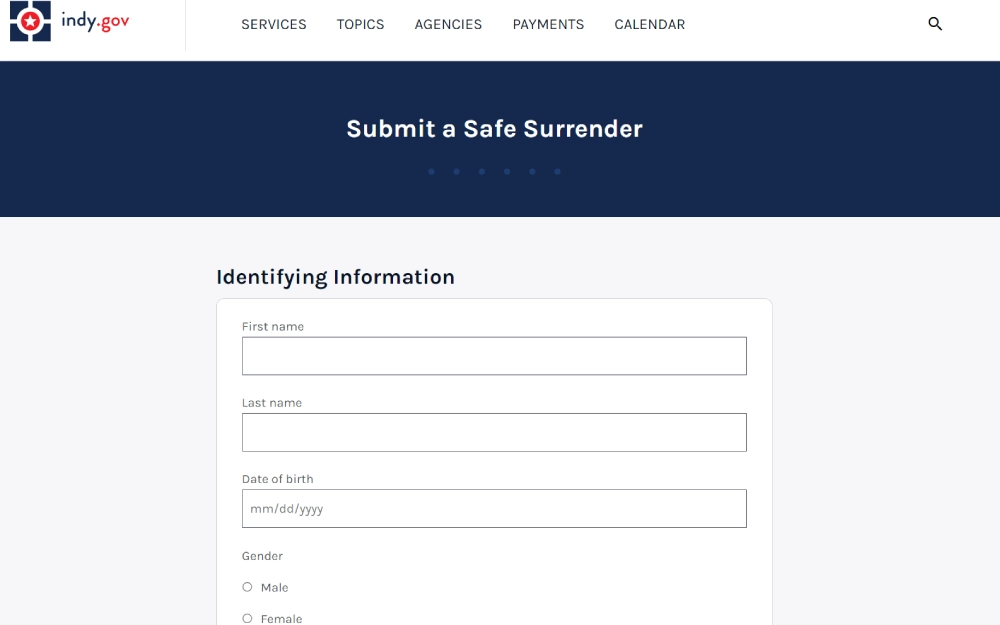
No matter what the situation, it’s always a good idea to seek advice before acting on the information you find in an Indiana warrant search.
For additional insight into citizens throughout the state, you can look through the Indiana arrest and criminal history search instructions and the IN free public record lookup overview.
References
1Indiana Office of the Treasurer of State. (2016). TOS guide to APRA [PDF document]. Retrieved December 20, 2023, from <https://www.in.gov/tos/files/TOS_Guide_to_APRA-Final1.pdf>
2Indiana Supreme Court. (n.d.). Home page. Retrieved December 20, 2023, from <https://www.in.gov/courts/>
3Indiana Supreme Court. (n.d.). Case search. Retrieved December 20, 2023, from <https://public.courts.in.gov/MyCase#/vw/Search>
4Indiana State Police. (n.d.). Limited criminal history search. Retrieved December 20, 2023, from <https://www.in.gov/ai/appfiles/isp-lch/>
5Lake County Sheriff’s Department. (n.d.). Warrant search. Retrieved December 20, 2023, from <http://lakecountysheriff.com/warrant/warrant-search.php>
6The Most Wanted Network. (2023, December 19). Allen County, Indiana. Retrieved December 20, 2023, from <https://www.themostwanted.net/Indiana/Allen/>
7Elkhart County Sheriff’s Office. (2010, July). Adult criminal history request form [PDF document]. Retrieved December 20, 2023, from <https://sheriff.elkhartcounty.com/documents/4827/3._Adult_Criminal_History_Request-fillable.pdf>
8Vanderburgh County Sheriff’s Office. (n.d.). Search warrants. Retrieved December 20, 2023, from <https://vanderburghsheriff.org/search-warrants/>
9City of Lafayette, Indiana. (n.d.). Forms center. Retrieved December 20, 2023, from <http://lafayette.in.gov/FormCenter/CustomView/51>
10Federal Bureau of Investigation. (n.d.). Ten Most Wanted Fugitives. Retrieved December 20, 2023, from <https://www.fbi.gov/wanted/topten>
11Public Access to Court Electronic Records (PACER). (n.d.). Home page. Retrieved December 20, 2023, from <https://pacer.uscourts.gov/>
12Indiana Prosecuting Attorneys Council. (2022). Title 35 Indiana Code 2022 [PDF document]. Retrieved December 20, 2023, from <https://www.in.gov/ipac/files/Title-35-Indiana-Code-2022.pdf>
13Indiana General Assembly. (n.d.). Indiana Code 2021. Retrieved December 20, 2023, from <https://iga.in.gov/laws/2021/ic/titles/35>
14Indiana Intelligence Fusion Center. (n.d.). If you see something, say something. Retrieved December 20, 2023, from <https://www.in.gov/iifc/if-you-see-something-say-something/>
15City of Indianapolis. (n.d.). Safe surrender. Retrieved December 20, 2023, from <https://www.indy.gov/workflow/submit-a-safe-surrender>
